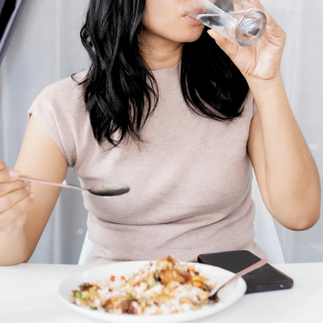Drinking Lots of Water But Still Thirsty? Here's Why!
- acupuncture herbs
- Jun 6, 2025
- 4 min read
Written by: Melody, TCM Practitioner

Ever wonder why you can chug a lot of water at once and still feel parched? Drinking a large amount of water quickly, while it might temporarily relieve thirst, doesn't truly hydrate your body effectively. In fact, it can sometimes lead to other health issues.
1️⃣ Overburdening Your Digestive System:
Gulping down too much water at once quickly distends your stomach, increasing the burden on your gastrointestinal tract. Your digestive system can't absorb it all in time, so excess water is quickly expelled from your body.
2️⃣ Diluting Stomach Acid:
Stomach acid helps digest food. A large volume of water can dilute stomach acid, affecting food digestion.
3️⃣ Increasing Heart Burden:
A sudden large influx of water into your bloodstream can increase the burden on your heart.
4️⃣ Electrolyte Imbalance:
Drinking a lot of water quickly can lead to a decrease in sodium ion concentration in your blood, causing hyponatremia.
Besides Chugging Water, What Else Causes Persistent Dehydration?
🔹 Wrong Time to Drink Water:
-Drinking around meals:
Drinking a lot of water before meals can dilute stomach acid, affecting digestion. Drinking immediately after meals can also dilute stomach acid, impacting nutrient absorption.
-Drinking large amounts during exercise:
While you sweat a lot during exercise and need to replenish fluids and electrolytes, drinking too much water at once can dilute sodium ions in your blood, leading to hyponatremia.
🔹 Inappropriate Water Temperature:
Water that's too cold or too hot can irritate your stomach and intestines, affecting water absorption.
🔹 Illness/Medication Effects:
Certain conditions, like diabetes or kidney disease, can affect how your body regulates and uses water. Some medications might also cause fluid loss.
🔹 Lifestyle Habits:
-Staying up late can affect your endocrine system, leading to disordered fluid metabolism.
-Spending long periods in air-conditioned rooms leads to dry air and easy fluid loss.
How TCM Views Water and Body Hydration
In TCM, water plays a crucial role in the human body, serving as the carrier of Yin-Yang and Five Element Qi, and participating in various physiological activities. TCM refers to water as "Jin Ye" (津液), and its generation, distribution, and metabolism are influenced by the combined efforts of the Spleen, Lungs, and Kidneys.
🔸 Spleen Deficiency with Dampness Obstruction (脾虚湿困):
The Spleen governs the transformation and transportation of water and dampness. If the Spleen is weak, its ability to move fluids diminishes, leading to fluid retention and edema. Even if you drink a lot of water, your body cannot use it effectively.
🔸 Insufficient Lung Qi (肺气不足):
The Lungs govern Qi and regulate respiration. The distribution of Jin Ye is closely related to Lung Qi. Insufficient Lung Qi leads to abnormal Jin Ye distribution, often causing symptoms like dry mouth and tongue, and dry skin.
🔸 Kidney Yang Deficiency and Cold (肾阳虚寒):
The Kidneys govern water. If Kidney Yang is deficient and cold, it cannot warm the fluids, leading to disordered fluid metabolism, resulting in edema and cold limbs.
🔸 Jin Ye Deficiency (津液亏虚): Significant consumption of Jin Ye, such as from fever or excessive sweating, leads to Jin Ye insufficiency. Even drinking water may not alleviate symptoms like thirst.

How to Drink Water Correctly?
🌟 Small Sips, Frequent Intervals:
Drink about 200 ml at a time, multiple times a day. Don't drink too much water all at once; drink small amounts frequently. This allows your body to absorb and utilize the water better.
🌟 A Glass of Warm Water in the Morning:
This promotes gastrointestinal peristalsis and helps the body detoxify.
🌟 Drink Less Water Before Bed:
Avoid frequent nighttime urination.
🌟 Adjust Water Intake According to Season:
Drink more water when it's hot, less when it's cold.
🌟 Choose the Right Water Temperature:
Warm water is the best choice. Warm water is closest to body temperature, so it's most easily absorbed by the body. Water that's too cold or too hot is not conducive to absorption.
🌟 Pay Attention to Drinking Times:
30 minutes before and 30 minutes after meals are optimal times for drinking water. Water before meals can promote digestion, and water after meals can aid digestion. Drinking water before exercise can prevent dehydration, and after exercise, it replenishes fluids.
🌟 Adjust Based on Body Needs:
Increase water intake appropriately after exercise, sweating, or in hot weather.
🌟 Mind Your Diet:
Eat more fruits and vegetables with high water content, such as watermelon and cucumber.
If these methods don't yield results, then you might consider TCM professional help.
How Can TCM Regulate This?
TCM treatment for disordered fluid metabolism primarily focuses on regulating the Spleen, Lungs, and Kidneys. Common methods include:
🌱 Herbal Medicine:
Based on different patterns, Chinese herbs with effects such as strengthening the Spleen and invigorating Qi, nourishing Yin and moistening dryness, or warming Yang and promoting urination are selected.
🌱 Acupuncture:
Through acupuncture, relevant acupoints are stimulated to regulate organ functions and promote fluid metabolism.
🌱 Dietary Therapy:
Maintain a light diet, drink plenty of water, and eat Yin-nourishing and dryness-moistening foods, such as tremella fungus and lily bulbs.
🌱 Lifestyle Regulation:
Ensure adequate sleep, avoid excessive fatigue, and pay attention to keeping warm.
In summary, drinking too much water at once is like using a large bucket to water a flower 🌷; even though there's a lot of water, the pot is too small to absorb it all, and it might even drown the flower. However, drinking small amounts of water frequently is like slowly watering a flower with a small watering can, allowing the flower to gradually absorb the moisture and grow better.
Drinking water isn't just about quantity, but also about quality and timing. Only scientific and reasonable drinking habits can ensure your body gets enough water and maintains normal physiological functions. If you consistently experience symptoms of bodily dehydration, it's advisable to consult a TCM practitioner for a differential diagnosis and treatment.
If you'd like to learn more about TCM wellness, or if you'd like more personalized advice for your specific situation, we recommend booking a consultation.















